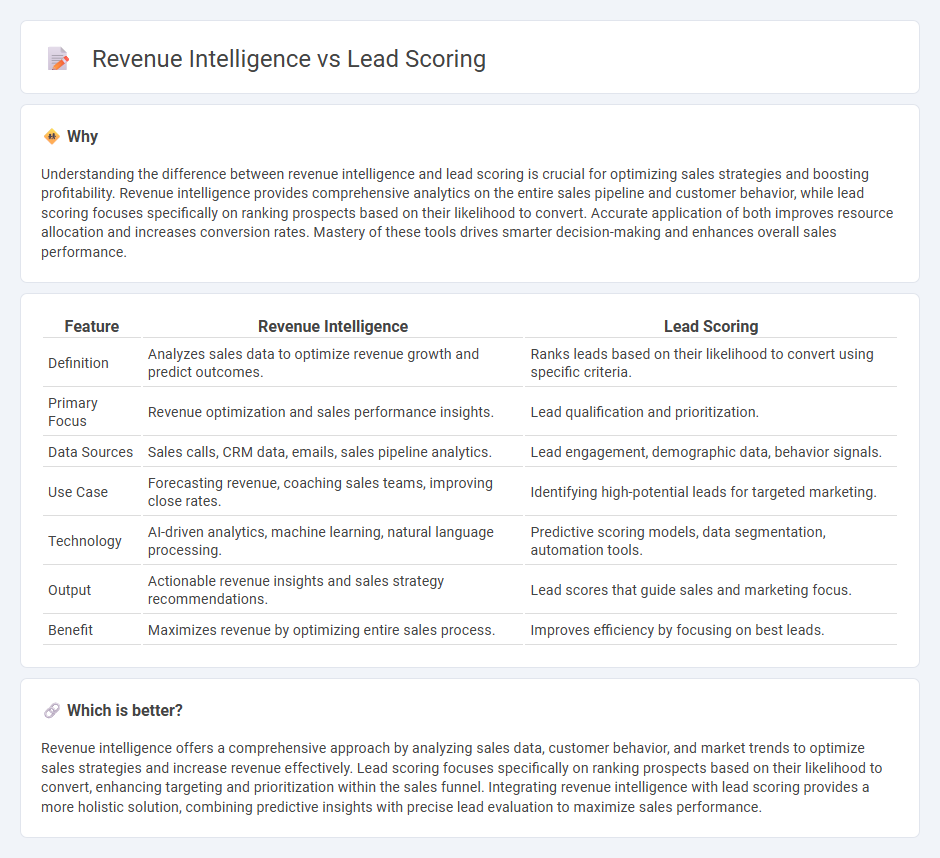
Revenue intelligence leverages data analytics and AI to provide deeper insights into the entire sales pipeline, enhancing forecasting accuracy and identifying revenue opportunities. Lead scoring focuses on evaluating and ranking potential customers based on their likelihood to convert, optimizing sales efforts and prioritization. Explore how combining revenue intelligence with lead scoring can revolutionize your sales strategy.
Why it is important
Understanding the difference between revenue intelligence and lead scoring is crucial for optimizing sales strategies and boosting profitability. Revenue intelligence provides comprehensive analytics on the entire sales pipeline and customer behavior, while lead scoring focuses specifically on ranking prospects based on their likelihood to convert. Accurate application of both improves resource allocation and increases conversion rates. Mastery of these tools drives smarter decision-making and enhances overall sales performance.
Comparison Table
| Feature | Revenue Intelligence | Lead Scoring |
|---|---|---|
| Definition | Analyzes sales data to optimize revenue growth and predict outcomes. | Ranks leads based on their likelihood to convert using specific criteria. |
| Primary Focus | Revenue optimization and sales performance insights. | Lead qualification and prioritization. |
| Data Sources | Sales calls, CRM data, emails, sales pipeline analytics. | Lead engagement, demographic data, behavior signals. |
| Use Case | Forecasting revenue, coaching sales teams, improving close rates. | Identifying high-potential leads for targeted marketing. |
| Technology | AI-driven analytics, machine learning, natural language processing. | Predictive scoring models, data segmentation, automation tools. |
| Output | Actionable revenue insights and sales strategy recommendations. | Lead scores that guide sales and marketing focus. |
| Benefit | Maximizes revenue by optimizing entire sales process. | Improves efficiency by focusing on best leads. |
Which is better?
Revenue intelligence offers a comprehensive approach by analyzing sales data, customer behavior, and market trends to optimize sales strategies and increase revenue effectively. Lead scoring focuses specifically on ranking prospects based on their likelihood to convert, enhancing targeting and prioritization within the sales funnel. Integrating revenue intelligence with lead scoring provides a more holistic solution, combining predictive insights with precise lead evaluation to maximize sales performance.
Connection
Revenue intelligence integrates data from multiple sales channels to provide actionable insights, enhancing the accuracy of lead scoring models. Lead scoring algorithms leverage this comprehensive data to prioritize prospects based on their likelihood to convert, improving sales efficiency and forecasting. Effective alignment of revenue intelligence and lead scoring drives higher close rates and optimized resource allocation in sales processes.
Key Terms
Lead Scoring:
Lead scoring quantifies the likelihood of a prospect converting by assigning scores based on demographic data, behavioral signals, and engagement levels, enabling sales teams to prioritize high-potential leads effectively. This method enhances sales efficiency by focusing efforts on leads exhibiting buying intent, thus improving conversion rates and shortening sales cycles. Discover more about how lead scoring drives targeted sales strategies and revenue growth.
Qualification Criteria
Lead scoring quantifies potential customers based on demographic and behavioral data to prioritize sales efforts effectively. Revenue intelligence leverages AI to analyze communication data and predict deal outcomes, providing deeper insights into qualification criteria. Discover how integrating both strategies can optimize your sales qualification process.
Predictive Analytics
Lead scoring uses predictive analytics to assign values to prospects based on behavior and demographic data, helping prioritize sales efforts. Revenue intelligence leverages predictive models to analyze the entire pipeline, integrating CRM data, email interactions, and sales activity to forecast revenue outcomes more accurately. Explore how advanced predictive analytics in both lead scoring and revenue intelligence can transform your sales strategy.
Source and External Links
What Is Lead Scoring? Definition, Models, Best Practices - Lead scoring is a method of assigning points to leads based on their behavior and attributes to identify and prioritize high-quality leads ready for sales engagement, boosting conversion rates and closing deals effectively.
Lead scoring - Lead scoring ranks prospects on a scale representing their value to the company using explicit data (like job title) and implicit data (like website visits), improving sales efficiency, marketing targeting, alignment, and revenue growth.
The Ultimate Guide to Lead Scoring - Lead scoring systematically ranks potential customers by likelihood to purchase based on demographics, behavior, and engagement, using a step-by-step process including setting minimum customer criteria and identifying target market traits.
 dowidth.com
dowidth.com